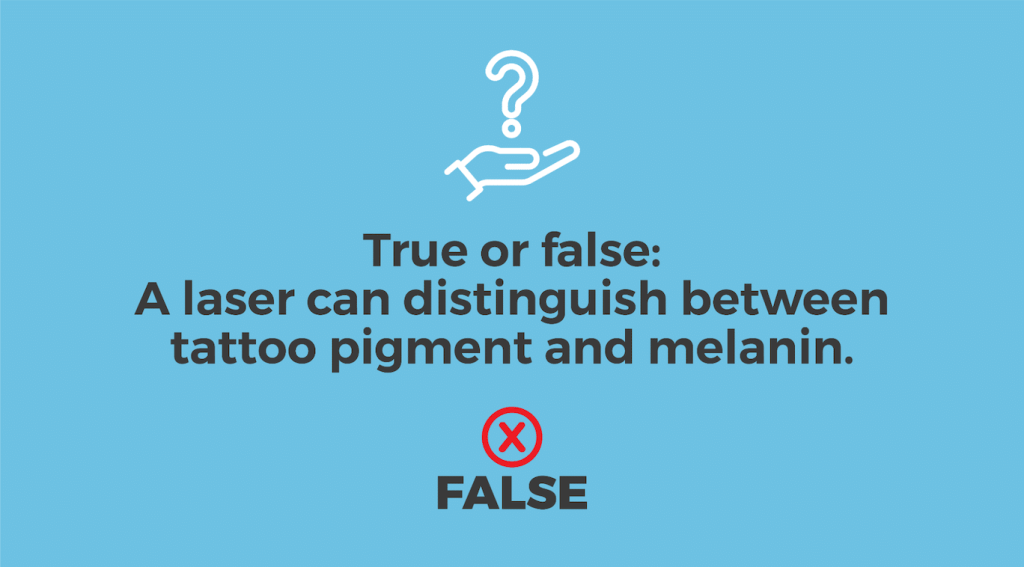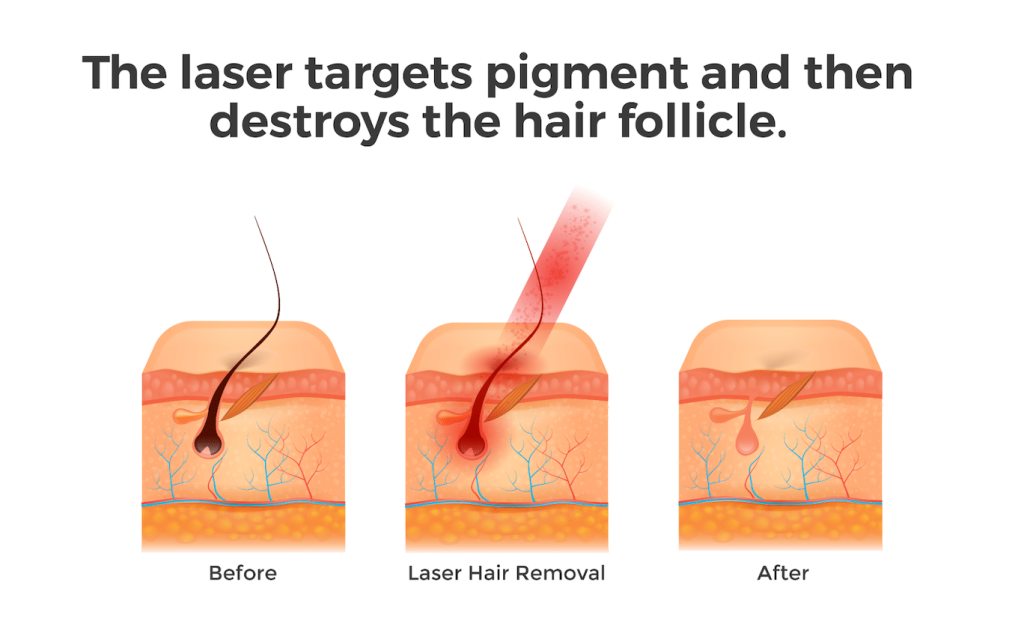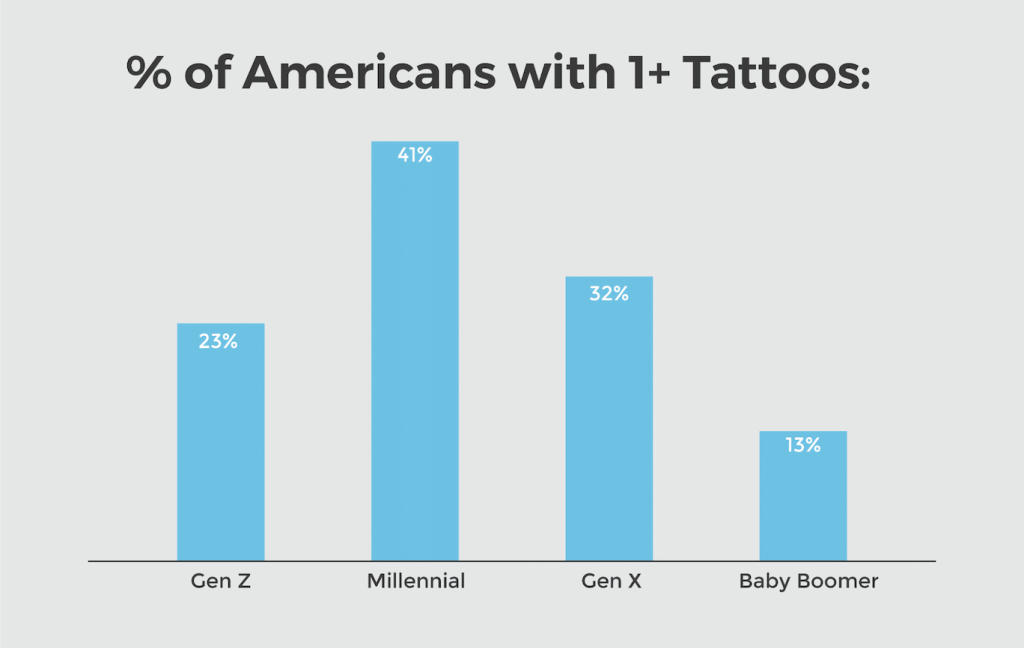
Does Laser Hair Removal Affect Tattoos?
The short answer to the question of “Does laser hair removal affect tattoos?” is yes, it does. The laser is incapable of distinguishing a hair follicle from tattoo ink. That means if the laser is applied to the tattoo, it’ll disperse the ink and cause the color to lighten or disappear entirely.
This shouldn’t put you off having laser hair removal done if it’s something you really want. That said, laser hair removal for people with tattoos typically requires a compromise to work around the tattoo based on the treatment area. This compromise may make more sense for some areas of the body but not for others.
Ultimately, you’ll need to consider your priorities and whether you’re willing to work around your tattoo before undergoing laser hair removal. You should also have a good understanding of the potential risk and what to expect. We’ve covered all of that in this guide.
Keep reading or use the links below to get a comprehensive answer to “Does laser hair removal affect tattoos?” and how you can undergo this treatment even if you do have them.
Does Laser Hair Removal Damage Tattoos?
Yes, using a laser for hair removal on an area that’s tattooed will cause damage. This is due to the fact the hair removal laser uses a concentrated ray of light to destroy hair follicles.
In contrast, a laser used for tattoo removal pulses light into the ink particles and causes the particles to shatter into fragments. If a hair removal laser comes into contact with a tattoo, it will damage the tattoo, even if it only touches the edge.
How Does Laser Hair Removal Affect Tattoos Long Term?
The answer to the question “Does hair removal with a laser affect tattoos long term?” is yes. The laser used for hair removal is different from the type that’s used to remove tattoos. Both types of lasers affect tattoo ink, but the hair removal laser can damage the tattoo and skin.
When a hair removal laser touches tattoo ink, it can result in blisters and burns on the skin. The laser can also make colors fade or permanently damage the tattoo.
It’s worth noting the fact that laser hair removal is safe, as is laser tattoo removal, when the appropriate type of laser is used for its intended purposes.
Can You Get Laser Hair Removal with Tattoos?
Yes, you can get laser hair removal with tattoos, but the method in which the hair removal is handled depends on the placement of the tattoo and the area of the body that’s being treated.
You can get laser hair removal on areas of your body that don’t have tattoos and not concern yourself with damage. However, if you want hair removal in an area with a tattoo, the technician will cover your tattoo and leave a margin of skin around the tattoo untouched.
You’ll have to use other methods of hair removal on and around the tattoo after laser hair removal has been completed.
What Hair Removal Treatments Are Safe for Tattoos?
Hair removal treatments that only affect the surface layer of the skin are safe for tattoos. This is because tattoo ink is “punched” into the lower layers of the dermis, causing the ink particles to become trapped in place.
It’s safe to use a depilatory, razor, or wax for removing hair on a tattoo, as these methods won’t damage or otherwise disturb tattoo ink.
How Does Laser Hair Removal Work?
Laser hair removal works by targeting a pulse of intense, focused light at hair follicles. The light is then absorbed by the pigment in the hair follicles, where it’s converted into heat. The hair follicle is damaged by the heat, reducing or preventing hair regrowth.
The process is similar to tattoo removal because both rely on the pigment in the intended target–hair follicle or tattoo–to absorb the light from the laser.
There are five types of lasers commonly used in hair removal. They include:
- Ruby
- Alexandrite
- Diode
- Nd:YAG (neodymium-doped yttrium aluminum garnet)
- Intense pulsed light (IPL)
Each laser type has a different wavelength that’s effective at destroying different types of hair textures and colors. Ultimately, the type of laser used is dependent on the hair and skin color combination, and its effectiveness is partly due to its design and partly due to the skill of the technician.
How Can You Reduce the Risks of Laser Hair Removal with Tattoos?
There is always a risk of laser hair removal side effects because of the nature of the treatment. Hair removal lasers are designed to deliver a finely focused beam of light into your hair follicle in order to destroy the hair at the root. This action can also irritate or damage your skin and cause it to respond in one of the following ways:
- Blistering
- Crusting
- Redness and/or irritation
- Burns or other injuries to the skin.
- Change in skin color (lighter or darker)
However, side effects of laser hair removal are fairly rare and usually mild.
Your provider will give you instructions to help you prepare for laser hair removal and reduce the risks of side effects. You can greatly reduce the risk of one or more of these side effects by taking the following precautions:
Stay away from the sun
Skin that has recently been sunburned or tanned can’t be treated with a laser as it can result in further skin damage. Stay covered when you’re outside for at least two weeks before your next appointment.
Don’t use certain types of skin care products
Discontinue using skincare products that contain retinol, glycolic acid, benzoyl peroxide, salicylic acid, and any other product that removes the upper layer of skin for at least three days before treatment. These products make your skin more photosensitive and can result in a burn from laser hair removal.
No tweezing or waxing between appointments
The goal of laser hair removal is to destroy the entire hair follicle so it won’t grow back. Waxing and tweezing have the effect of pulling hair out down to the root, which means the laser won’t be effective.
Shave the area being treated
Shave 24 hours before your appointment unless otherwise told not to. If you’re getting your bikini area treated and you’re prone to razor irritation, shave the area a few days before the appointment to reduce the risk of side effects.
Is Laser Hair Removal Right for You?
Hair removal lasers have different frequencies, also known as wavelengths, that are effective on different types of skin and hair color combinations. The best candidates for hair removal are people with dark hair color and light skin, but advances in laser hair removal technology have made it so more hair and skin color combinations can benefit.
Laser hair removal is possible for those who have light skin and blonde hair, although this color combination has historically been the most difficult to treat with laser hair removal. Despite innovations, there’s no laser that can treat white, gray, light blonde, very light red, or peach fuzz hair.
Laser hair removal is more effective than many other treatments like electrolysis and typically takes fewer sessions to stop the regrowth of unwanted body hair. Each session of laser hair removal covers a larger area than electrolysis, is less painful, and offers faster results. Your skin also heals more quickly, and there are fewer risks of side effects.
If you’re still not sure about getting laser hair removal done, you can get further clarity during a consultation with your prospective laser hair removal provider.
Schedule Your Consultation for Laser Hair Removal
Laser hair removal only affects tattoos if they happen to be located in the area where you’re seeking the removal of unwanted body hair. In the event a hair removal laser comes into contact with your tattoo, it can cause damage to the pigment and potentially your skin as well.
Laser hair removal puts a tattoo at risk due to the fact it uses an intensely focused pulse of light to destroy the root of the hair follicle. An experienced laser technician can protect the tattoo from damage by covering it up prior to treatment. After the treatment has finished, you’ll need to remove the remaining hair with a razor, wax, or depilatory going forward in order to maintain a completely smooth appearance.
If that sounds like something you can manage, it’s time to move forward with your laser hair removal!
At LivSmooth, we use the latest lasers for the best results, and we guarantee our work for life. Whether you’re looking for full-body laser hair removal or only need treatment on a small area, we can help you achieve the hair-free skin you desire. All of our treatments are performed by certified Nurse Practitioners, which means you can be assured you’ll receive safe, effective care during your session.
Contact LivSmooth today to set up a consultation for your hair removal needs and learn more about how we handle the removal of hair around a tattoo. We’re here to help you get rid of unwanted hair and provide the best possible experience while doing it.











